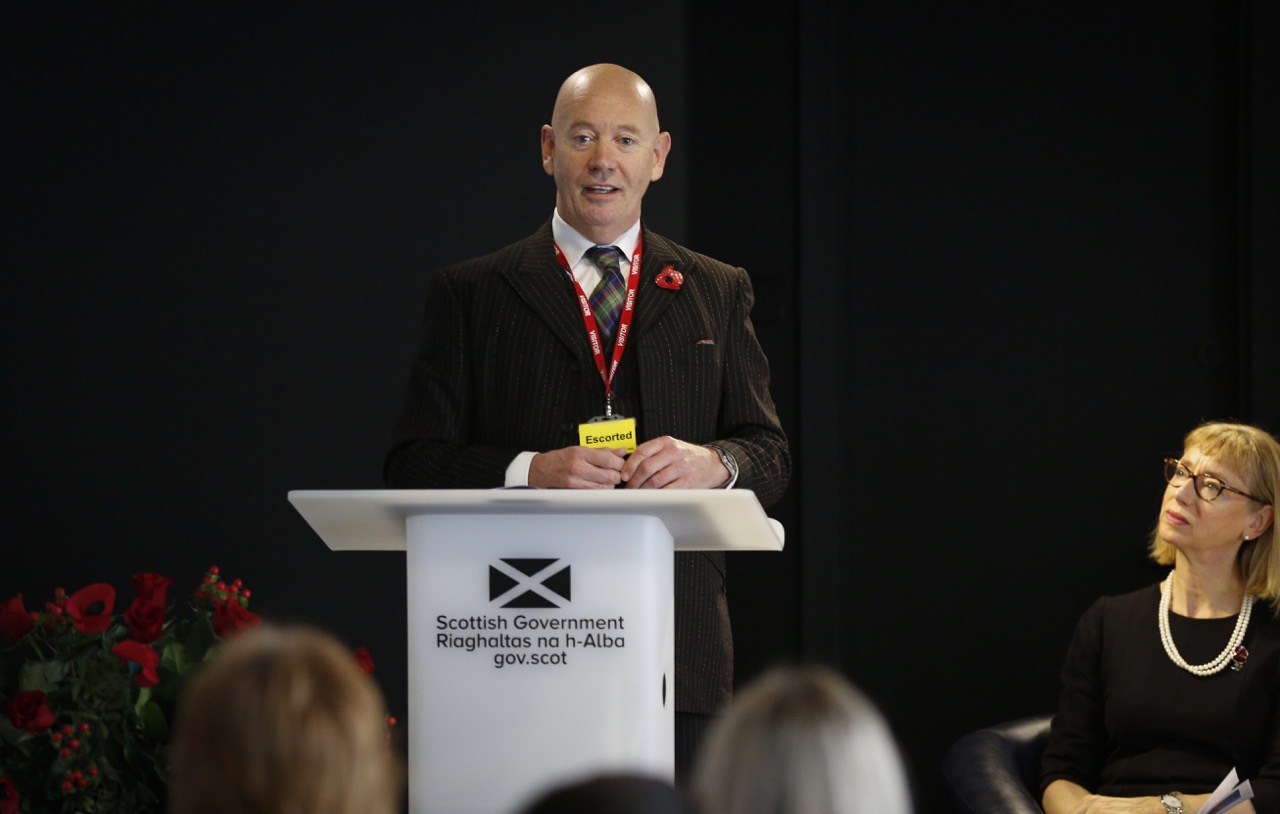I was honoured last week to be invited to participate the Scottish Government’s Remembrance Day at St. Andrew’s House.
Last year, I became the first humanist ever to be invited to speak at an official government event, which was a pretty big deal: as I said in this article in The Herald, “it seems fitting that on the 99th anniversary of the end of the First World War, the sacrifices which have been made, and which continue to be made by non-religious members of the Armed Forces are finally being recognised”.
This year, I spoke about the forgotten language of flowers, and if you’re interested, here’s a transcript.
My memory is terrible these days and that’s strangely appropriate. It wasn’t until I began writing this speech that I remembered that for thousands of years, the poppy wasn’t ‘the flower of remembrance’ but ‘the flower of forgetfulness’: our earliest ancestors ate its seeds to relieve pain, and the opiates derived from it are still a vital part of modern medicine.
I had thought it became the ‘flower of remembrance’ because of the Great War, but it was actually a hundred years earlier that an unknown writer first noticed the blood-red poppy blooming on the broken battlefields of the Napoleonic Wars, and recognised its symbolic power.
When I was a small boy, I was walking with my father when he stopped to speak to an elderly gentleman. He invited me to shake his hand, and when we’d walked away, my father told me I had just shaken hands with a man who had shaken hands with a man who had fought at the last battle of the Napoleonic Wars: Waterloo.
You probably remember that the British Army was led that day by The Duke of Wellington, and that he claimed the battle was won ‘on the playing fields of Eton’. He didn’t say that, and it’s not true, but then the truth, as Oscar Wilde observed, is never pure, and rarely simple.
What we don’t remember is that like Oscar Wilde, The Duke of Wellington was an Irishman, and almost half his army were Irish,Welsh or Scots: the other half were mostly German, Dutch or Belgian. Only one in eight of his soldiers was English, but that has been largely forgotten: as we know, history is written by the victors, and the myth of ‘plucky little Albion’ is still far more politically powerful than the inconvenient, multi-national truth.
100 years after Waterloo, there were still many Irishmen in the British Army and one of them was my great uncle, Private Daniel Maguire, who served at the infamous battle of Passchendaele. Almost a million soldiers died and at the end of it, the British front line had moved only 5 miles further east and if anything can be said to sum up the heroism and the futility of that
battle, then Danny’s story is it. He led a stretcher party into no man’s land to retrieve a wounded comrade, but the gunners far to the rear got their elevation wrong so he was blown up and killed by a British shell.
More than 200,000 other Irish men and women served in the British forces during World War One, but even now, it takes a brave man to wear a poppy on the streets of Dublin: the Irish Taoiseach, Leo Varadkar is one. This time last year he wore a ‘Shamrock Poppy‘ in the Dáil and as he said, “Let history be our guide but let us never be its prisoner.”
Like the truth, the poppy’s meaning is neither pure nor simple, much as we might wish it to be, which is why there are so many of them today.
At the Cenotaph, Theresa May will wear a khadi poppy in memory of the one and a half million Indian soldiers who served on the Western Front. Some will wear a black poppy for the three million Africans, West Indians and Pacific Islanders; others will wear a ‘Shamrock Poppy‘, others still may wear a purple one, for the animals that gave their lives. In the past, Jeremy Corbin has worn a white poppy, but ‘a spokesman says’ that on Sunday he will be wearing a red one: the culture war over the poppy’s meaning continues.
The debate about the meaning of Remembrance Day has been going on for longer than Remembrance Day itself. The humanist philosopher Bertrand
Russell was an outspoken opponent of the Great War, and his pacifism cost him six months in prison.
On the very day that the armistice was signed, a mob of Cambridge
students made for his rooms and trashed them. Russell had said the war was
wrong. They said it had been right, and anyway, we won it.
Russellnever stopped believing that we humans need to practise being kind if we are ever to achieve happiness as a species. He never stopped campaigning either, and at the age of eighty-nine, he received another prison sentence for leading a CND protest in Trafalgar Square.
As he wrote: “There lies before us, if we choose, continual progress in happiness, knowledge and wisdom. Shall we instead choose death because we cannot forget our quarrels? Remember your humanity, and forget
the rest.”
What do you think? Should the poppy continue to be the flower of remembrance, or should we allow it, once again, to be the flower of forgetfulness?
It’s rare to see me and The Pickled Piper in the same photograph: alongside him, from left to right are the Reverend Tom Gordon,Lesley Evans, the Permanent Secretary to The Scottish Government, Libby Talbot, the Associate Rector of Ps & Gs Church, and Ameed Versace & Shabir Beg of the Scottish Ahlul Bayt Society.



0 Comments Leave a comment